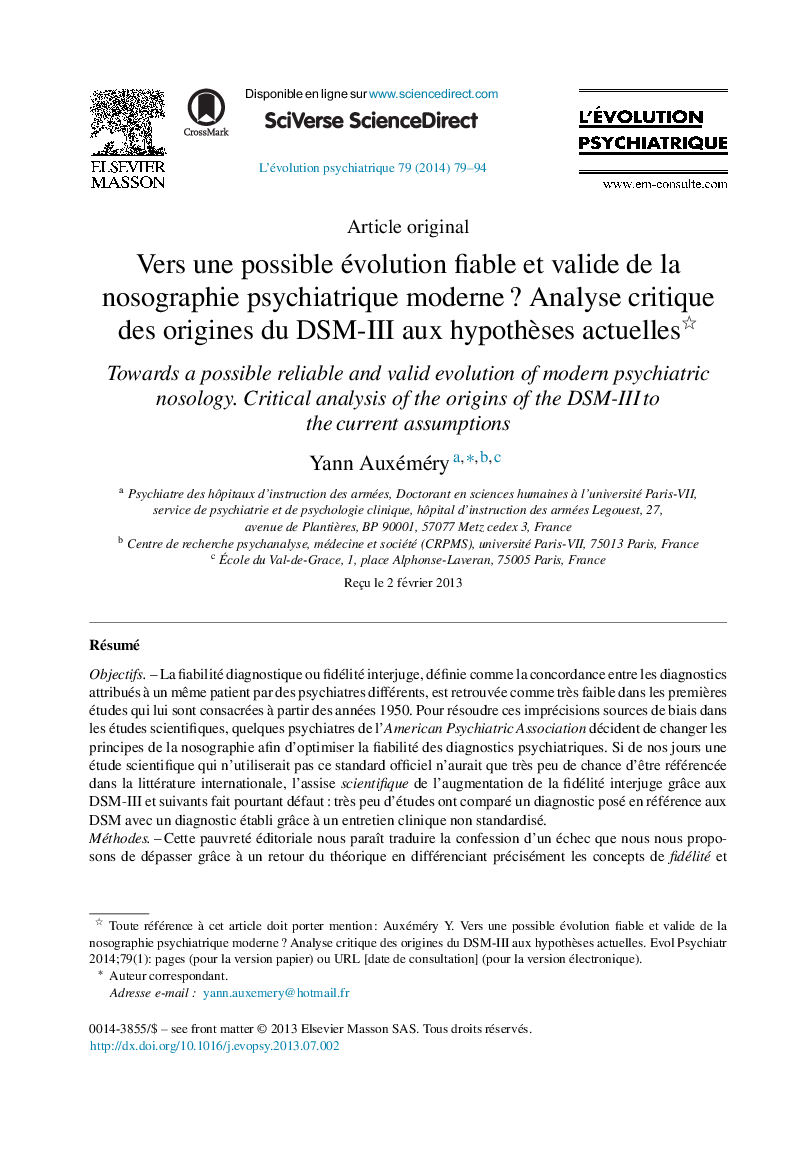| کد مقاله | کد نشریه | سال انتشار | مقاله انگلیسی | نسخه تمام متن |
|---|---|---|---|---|
| 908661 | 917190 | 2014 | 16 صفحه PDF | دانلود رایگان |

RésuméObjectifsLa fiabilité diagnostique ou fidélité interjuge, définie comme la concordance entre les diagnostics attribués à un même patient par des psychiatres différents, est retrouvée comme très faible dans les premières études qui lui sont consacrées à partir des années 1950. Pour résoudre ces imprécisions sources de biais dans les études scientifiques, quelques psychiatres de l’American Psychiatric Association décident de changer les principes de la nosographie afin d’optimiser la fiabilité des diagnostics psychiatriques. Si de nos jours une étude scientifique qui n’utiliserait pas ce standard officiel n’aurait que très peu de chance d’être référencée dans la littérature internationale, l’assise scientifique de l’augmentation de la fidélité interjuge grâce aux DSM-III et suivants fait pourtant défaut : très peu d’études ont comparé un diagnostic posé en référence aux DSM avec un diagnostic établi grâce à un entretien clinique non standardisé.MéthodesCette pauvreté éditoriale nous paraît traduire la confession d’un échec que nous nous proposons de dépasser grâce à un retour du théorique en différenciant précisément les concepts de fidélité et de validité diagnostique, ce dernier considérant l’existence même du diagnostic en intégrant ses origines étiopathogéniques, sa « vérité » clinique et finalement son intérêt pour la prise en charge thérapeutique.RésultatsLes velléités d’« athéorisme » ne sont plus d’actualité dans le DSM-V : la validité des diagnostics devrait augmenter par la définition précise de déterminants psychopathologiques et sociologiques associés à la caractérisation de marqueurs biologiques et/ou neuroradiologiques qui construiront une théorie étiopathogénique de chaque phénomène psychique.DiscussionUne telle classification resterait par définition réductrice : un code diagnostique ne sera jamais un sujet en ce sens qu’il ne suffit pas à transmettre notre clinique subjective.ConclusionComme lors de notre démarche clinique, la prise en compte de nos subjectivités individuelles et sociétales vers la définition d’une nouvelle nosographie nous semble fondamental à l’avenir de la psychiatrie.
BackgroundDiagnostic reliability or inter-rater accuracy, defined as the concordance between diagnoses assigned to a patient by different psychiatrists, was found to be very low in the first studies devoted to the subject since the 1950s. To resolve these inaccuracies, sources of bias in scientific studies, a few psychiatrists from the American Psychiatric Association decided to change the principles of nosography in order to optimise the reliability of psychiatric diagnoses. These days, a scientific study that does not use this official standard will have very little chance of being cited in the international literature, but the scientific basis of the increase in inter-rater accuracy thanks to the DSM-III and following is however lacking: very few studies have compared a diagnosis established in relation to the DSM with a diagnosis established as a result of a non-standardised clinical interview.MethodThis editorial poverty seems to us to convey a confession of failure that we aim to overcome with a return to theory by precisely differentiating the concepts of diagnostic accuracy and validity, the latter considering the existence of the diagnosis itself by integrating its etiopathogenic origins, its clinical “verity” and finally its interest in terms of the therapeutic treatment.ResultsThe “atheoretical” notions are no longer relevant in the DSM-V: the validity of the diagnoses should increase through the precise definition of psychopathological and sociological determinants associated with the characterisation of biological and/or neuroradiological markers which will build an etiopathogenic theory of each psychic phenomenon.DiscussionClassification like this will remain, by definition, reductive: a diagnostic code will never be a subject in that it is not enough just to provide our subjective clinical.ConclusionAs with our clinical approach, taking into account our individual and societal subjectivities in defining a new nosography seems to us fundamental for the future of psychiatry.
Journal: L'Évolution Psychiatrique - Volume 79, Issue 1, January–March 2014, Pages 79–94